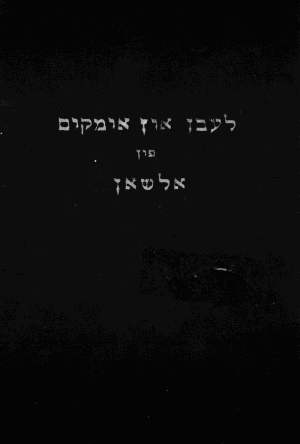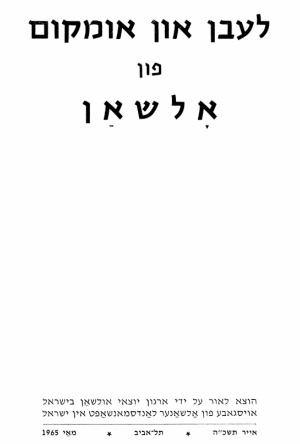 |
 |
54°15' / 26°01'
Translation of
Lebn um umkum fun Olshan
Edited by: Former residents of Olshan in Israel (Irgun Yotzey Olshan)
Published in Tel Aviv, 1965
Acknowledgments
Project Coordinators
Sheldon Clare (emeritus)
This is a translation from: Lebn um umkum fun Olshan;
The life and destruction of Olshan. Tel Aviv, former residents of Olshan in Israel (Irgun Yotzey Olshan), 1965. (H,Y)
Note: The original book can be seen online at the NY Public Library site: Olshan
Purchase details for a printed copy of this translation can be found at https://www.jewishgen.org/yizkor/ybip/YBIP_golshany.html
JewishGen, Inc. makes no representations regarding the accuracy of
the translation. The reader may wish to refer to the original material
for verification.
JewishGen is not responsible for inaccuracies or omissions in the original work and cannot rewrite or edit the text to correct inaccuracies and/or omissions.
Our mission is to produce a translation of the original work and we cannot verify the accuracy of statements or alter facts cited.
I am a retired physician, now 88, born in 1927 in Baltimore, living in San Francisco since 1951. I received my B.A. from Johns Hopkins U. in 1947, and my M.D. from U. of Maryland in 1951. Since then, I have been writing intermittently, initially in the scientific area, then more generally, mostly essays, reportage, memoirs, poetry, and a few translations from German. I knew very little about my family background. But my son, who is much more interested in genealogy than I, had come up with some interesting new information about my father's origins, new to me. He had ferreted out copies of my father's naturalization certificate and his draft registration, which led to additional facts about the actual location of his village in Poland-I had always thought it was in Russia. My father had served in the Russian Army in WWI, and had been wounded. When he came to the US in 1923, he left behind a family, a wife and two sons. Somehow he, his mother and younger sister made their way to Copenhagen, and boarded a ship to America. And the outlines of his subsequent history were fairly clear. He had married my mother in 1926; she had come from a shtetl in Latvia, named Preili. But what about his earlier history in Poland? His shtetl was named Olshon or Olshan, near Lithuania, an area occupied by the Germans in WWI, then for three years by the Russians, interrupted by Cossack raids, then again by the Poles, the Russians, and finally by the Germans. During the Russian interval, my father had been drafted into the Russian army. Then came a momentous finding by my son. He had discovered, from an archive in the NY Public Library, a Yizkor book about Olshan. A Yizkor book is a remembrance volume, dedicated to the history of a town and its inhabitants, and there were many such volumes to honor each small town eradicated by the holocaust. As I glanced at this volume on-line, I noted that the more Polish name of the town was Holshany, that there were 580 pages, and it was all in Yiddish. I had learned to read and understand Yiddish in my childhood, and with the aid of some fluency in German, a dictionary and a few consultants, I began to read. I found that I was able to translate most of the material, much of it written in a clear colloquial style, reminiscent of the sounds of my childhood. Of course I hoped to find some mention of my family name, and indeed I came across several brief references, in a list of land plot owners- a pair of brothers perhaps, dated 1929, most likely cousins. The Necrology contained two memorials for at least three with my family name, and also one picture I remembered as the husband of my aunt. The history described daily life in the shtetl of Olshan, before, during and after WWI, the inter war period and the Holocaust in great detail, enlivened by personal anecdotes about many of the more prominent town inhabitants, often enhanced by nicknames. A final section describes the remarkable odyssey of a young man's career as a partisan.And so I became engrossed first by the challenge of the translation, then by the remarkable vignettes themselves, culminating in the exciting survival odyssey of a young partisan fighter. I was informed that this Yizkor book was originally translated by Sheldon I. Clare, under the auspices of JewishGen. Repeated contacts with Mr. Clare and the associated web searches have revealed only the Table of Contents, the Necrology and one chapter on “The Jews of my Generation”. Therefore I have undertaken my own comprehensive translation. |
| Jack Leibman |
|
|
| [Page 2]
Executive Committee Shabtai Kaplan, Ziml Abramovitch, Pesakh Gershonovitch, Shifra Kotin-Trabski, Reuven Leond, Aharon Shuster Members Aharon Abramovitch, Arye Gershoni, Yitzhok Khodosh, Yakov Kozlovski, Khaniya Yisraeli (Gurvitz), Moshe Ziskond Editor of Hebrew Part Meir Shli [Page 3]
|

 Yizkor Book Project
Yizkor Book Project
 JewishGen Home Page
JewishGen Home Page
Copyright © 1999-2026 by JewishGen, Inc.
Updated 15 Feb 2023 by JH